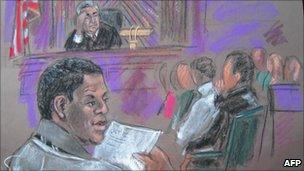Ghailani case foreshadows future terror trials
- Published

The start of Mr Ghailani's trial has been postponed until 12 October
The civilian trial of terror suspect Ahmed Khalfan Ghailani received a major setback when Judge Lewis Kaplan ruled to prevent the testimony of a key government witness.
Mr Ghailani, a Tanzanian man believed to be in his early 30s, is accused of aiding the al Qaeda-led bombings of the US embassies in Kenya and Tanzania, which killed 224 people.
The defendant, who was held at secret US prison sites before being transferred to Guantanamo Bay in 2006, is the first prisoner from that facility to be tried in a civilian court.
His case is being watched carefully for indications as how civilian trials might be handled for other so-called "high-value detainees", including alleged 9/11 mastermind Khalid Sheik Mohammed.
'Coercive interrogation'
In Mr Ghailani's case, the prosecution opted to forego the use of statements the defendant had made during questioning by the CIA at US "black sites" as well as in Guantanamo Bay.
Defence lawyers argue his statements were made under duress, and as such are inadmissible.
In choosing to proceed without this evidence, prosecutors can avoid debates over the use of coercive interrogation techniques.
But the decision not to use these statements, which prosecutors say amount to a confession, means the government will not be using some of its most powerful evidence - including Mr Ghailani's admission that he had later worked as a driver for Osama Bin Laden and had met several of the 9/11 attackers.
The identity of Hussein Abebe - from whom Judge Lewis Kaplan refused to allow testimony - was revealed during the course of these interrogations.
Government prosecutors had argued that Mr Abebe, who claims to have sold Mr Ghailani the explosives used in the Tanzania bombing, was a willing witness who had been eager to testify.
They also contend that Mr Abebe would have been found without Mr Ghailani's confessions.
Judge Kaplan disagreed, arguing that the government had failed to prove that Mr Abebe's testimony would be sufficiently removed from Mr Ghailani's allegedly coerced statements - thus rendering his testimony unconstitutional.
Weakened case
The decision is not only a major blow to the government's case - prosecutors had called him a "giant" witness who could illustrate that Mr Ghailani was not the clueless participant in the bombings he claimed to be - but it may also have implications for how future cases based on information gleaned at Guantanamo are mounted.
Other aspects of the trial may also set a precedent for the future terrorism cases in civilian courts.
Judge Kaplan ruled in July that the length of Mr Ghailani's detention - more than six years - did not undermine his constitutional right to a swift trial.
Other terror suspects have been held by the US without trial for even longer periods.
And, although the judge made no ruling on Mr Ghailani's allegations of torture at the hands of US officials, he did rule that the allegations, regardless of their veracity, were not sufficient to justify dismissing the charges against him.
The delay in prosecuting these terror cases has had additional evidentiary implications.
For Mr Ghailani, several government witnesses have died since his capture, potentially weakening the government's case.
- Published18 November 2010